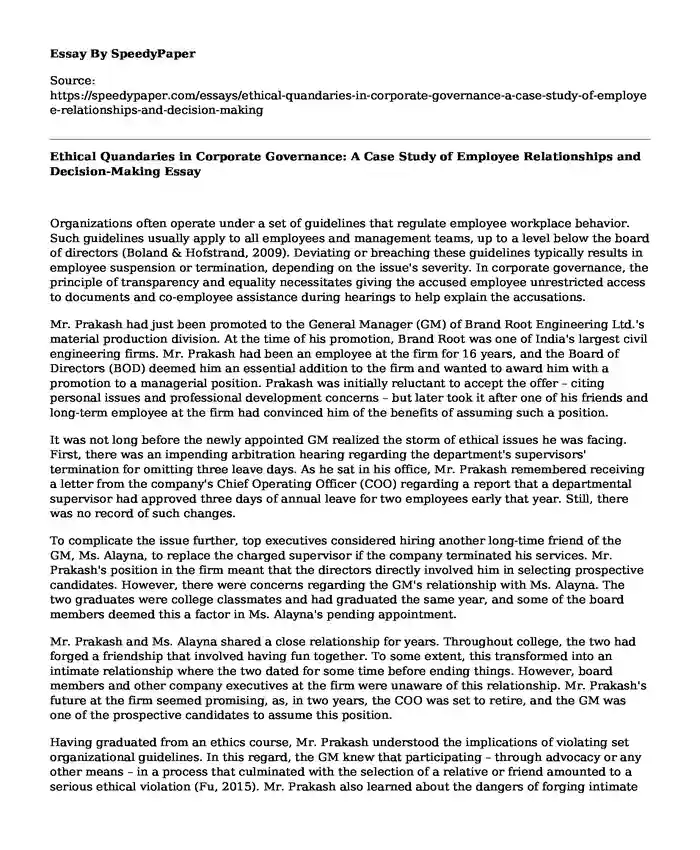
| Type of paper: | Essay |
| Categories: | Employment Relationship Corporate governance |
| Pages: | 3 |
| Wordcount: | 618 words |
Organizations often operate under a set of guidelines that regulate employee workplace behavior. Such guidelines usually apply to all employees and management teams, up to a level below the board of directors (Boland & Hofstrand, 2009). Deviating or breaching these guidelines typically results in employee suspension or termination, depending on the issue's severity. In corporate governance, the principle of transparency and equality necessitates giving the accused employee unrestricted access to documents and co-employee assistance during hearings to help explain the accusations.
Mr. Prakash had just been promoted to the General Manager (GM) of Brand Root Engineering Ltd.'s material production division. At the time of his promotion, Brand Root was one of India's largest civil engineering firms. Mr. Prakash had been an employee at the firm for 16 years, and the Board of Directors (BOD) deemed him an essential addition to the firm and wanted to award him with a promotion to a managerial position. Prakash was initially reluctant to accept the offer – citing personal issues and professional development concerns – but later took it after one of his friends and long-term employee at the firm had convinced him of the benefits of assuming such a position.
It was not long before the newly appointed GM realized the storm of ethical issues he was facing. First, there was an impending arbitration hearing regarding the department's supervisors' termination for omitting three leave days. As he sat in his office, Mr. Prakash remembered receiving a letter from the company's Chief Operating Officer (COO) regarding a report that a departmental supervisor had approved three days of annual leave for two employees early that year. Still, there was no record of such changes.
To complicate the issue further, top executives considered hiring another long-time friend of the GM, Ms. Alayna, to replace the charged supervisor if the company terminated his services. Mr. Prakash's position in the firm meant that the directors directly involved him in selecting prospective candidates. However, there were concerns regarding the GM's relationship with Ms. Alayna. The two graduates were college classmates and had graduated the same year, and some of the board members deemed this a factor in Ms. Alayna's pending appointment.
Mr. Prakash and Ms. Alayna shared a close relationship for years. Throughout college, the two had forged a friendship that involved having fun together. To some extent, this transformed into an intimate relationship where the two dated for some time before ending things. However, board members and other company executives at the firm were unaware of this relationship. Mr. Prakash's future at the firm seemed promising, as, in two years, the COO was set to retire, and the GM was one of the prospective candidates to assume this position.
Having graduated from an ethics course, Mr. Prakash understood the implications of violating set organizational guidelines. In this regard, the GM knew that participating – through advocacy or any other means – in a process that culminated with the selection of a relative or friend amounted to a serious ethical violation (Fu, 2015). Mr. Prakash also learned about the dangers of forging intimate relationships with co-workers, which was also an ethical violation.
Discussion Questions
- Should Mr. Prakash involve himself in this personnel issue? Why?
- Should he disclose his relationship with Ms. Alayna? Explain.
- Will his involvement alter the board’s decision?
- If you were the General Manager, how would you have handled the situation?
References
Boland, M., & Hofstrand, D. (2009). The role of the board of directors. Iowa State University. https://www.extension.iastate.edu/agdm/wholefarm/html/c5-71.html
Fu, I. (2015). Favoritism: Ethical dilemmas viewed through multiple paradigms. The Journal of Values-Based Leadership, 8(1), 6. https://scholar.valpo.edu/cgi/viewcontent.cgi?article=1115&context=jvbl
Cite this page
Ethical Quandaries in Corporate Governance: A Case Study of Employee Relationships and Decision-Making. (2024, Jan 19). Retrieved from https://speedypaper.net/essays/ethical-quandaries-in-corporate-governance-a-case-study-of-employee-relationships-and-decision-making
Request Removal
If you are the original author of this essay and no longer wish to have it published on the SpeedyPaper website, please click below to request its removal:
- Implementation of Information Technology in an Organization
- Essay Sample Dedicated to Correctional Leadership
- Free Essay. Literature Review on Fatherhood
- Free Essay: Madison & Hamilton Analysis of the Federalists Papers
- Free Essay Example. Golf Talent
- Free Essay Sample - Food Memoir
- Free Essay: Strengths and Weaknesses in Oral Presentation
Popular categories




